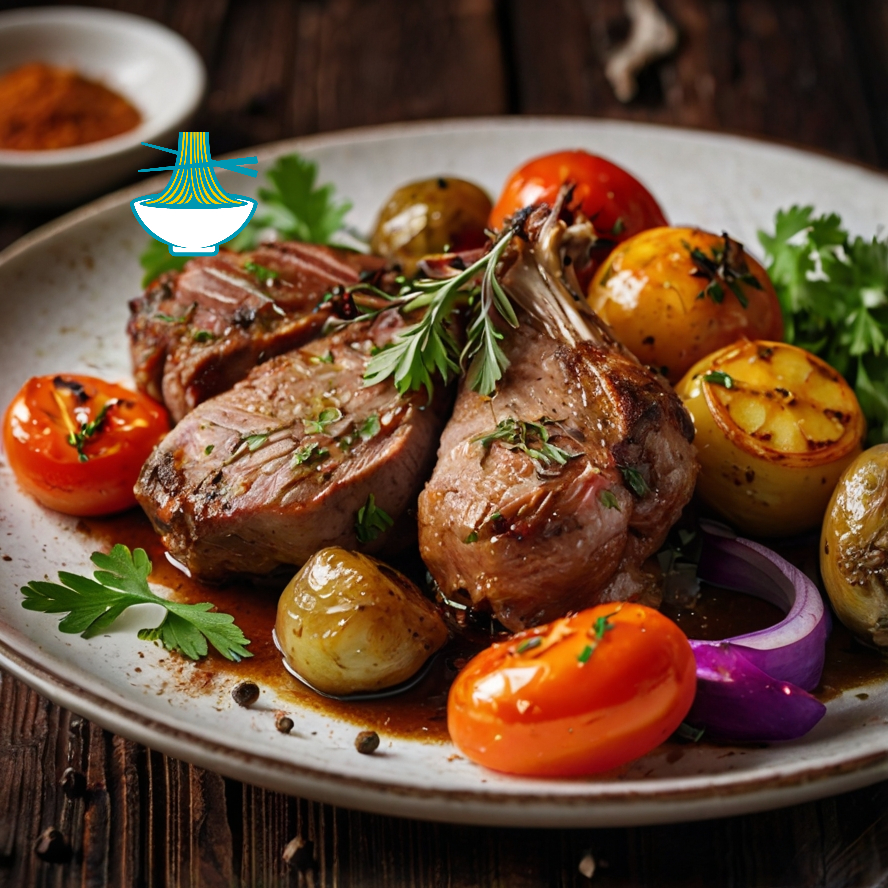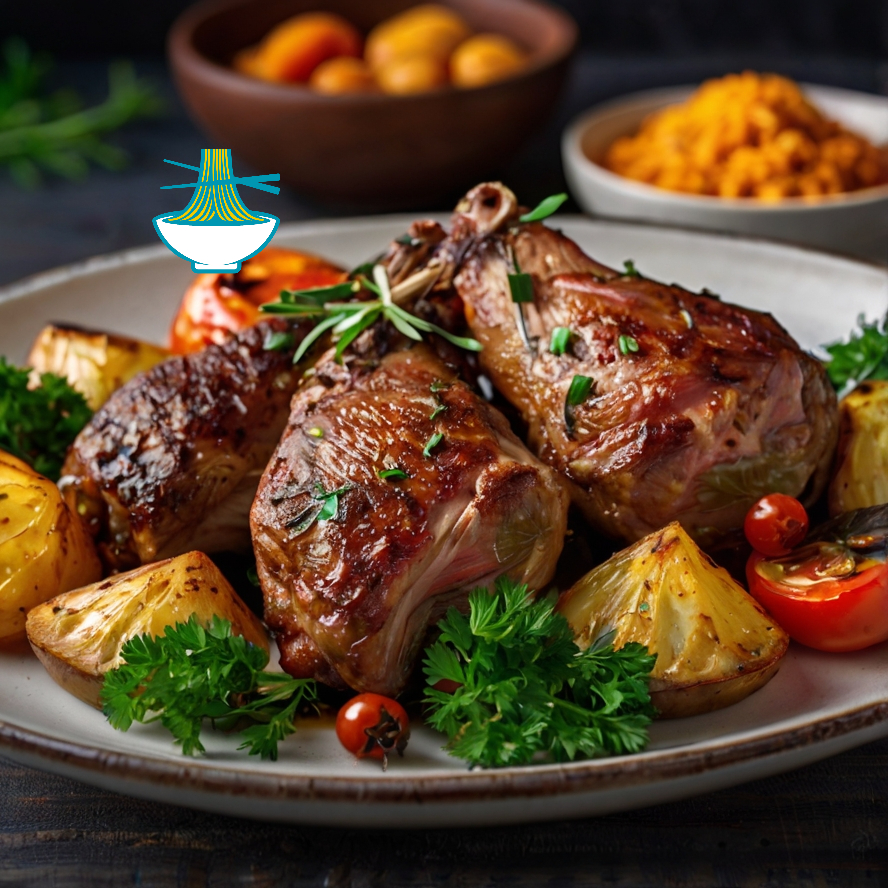Discover the savory tradition of Mosli, a succulent dish originating from North Africa. This centuries-old recipe features tender roasted meat—typically lamb or chicken—infused with aromatic spices and cooked alongside a medley of vegetables. With its roots in Berber cuisine, Mosli has evolved over time, embodying the rich culinary heritage of the region. Today, it continues to delight palates worldwide with its irresistible flavors and cultural significance.
Ingredients:
- 1 kg of lamb or chicken, cut into pieces
- 2 onions, finely chopped
- 4 garlic cloves, minced
- 2 tomatoes, diced
- 2 carrots, sliced
- 2 potatoes, diced
- 1 bell pepper, sliced
- 2 tablespoons olive oil
- 1 teaspoon ground cumin
- 1 teaspoon paprika
- 1 teaspoon ground coriander
- Salt and pepper to taste
- Fresh cilantro or parsley for garnish
Preparation:
1. In a large bowl, combine the meat with onions, garlic, tomatoes, carrots, potatoes, and bell pepper.
2. Add olive oil, cumin, paprika, coriander, salt, and pepper. Mix well to ensure all ingredients are coated.
3. Transfer the mixture to a roasting pan or baking dish.
4. Cover the dish with aluminum foil and let it marinate in the refrigerator for at least 1 hour, or overnight for best results.
5. Preheat the oven to 180°C (350°F).
6. Remove the foil from the dish and roast in the preheated oven for 1.5 to 2 hours, or until the meat is tender and the vegetables are cooked through.
7. Once done, remove from the oven and let it rest for a few minutes.
8. Serve hot, garnished with fresh cilantro or parsley.
Enjoy your delicious Mosli!
Nutrition Value:
1. Lamb or Chicken (1 kg):
- Calories: Lamb typically has around 250 calories per 100 grams, while chicken has around 165 calories per 100 grams.
- Protein: Lamb provides approximately 25 grams of protein per 100 grams, while chicken provides around 31 grams per 100 grams.
- Fat: Lamb contains about 20 grams of fat per 100 grams, while chicken contains around 3.6 grams per 100 grams.
- Minerals: Both lamb and chicken are good sources of minerals like iron, zinc, and phosphorus.
- Vitamins: They provide essential B vitamins, especially vitamin B12.
- Nutritional Benefit: Protein for muscle growth and repair, iron for blood health, and B vitamins for energy metabolism.
2. Onions (2 onions):
- Calories: Approximately 44 calories per 100 grams.
- Carbohydrates: Around 10 grams per 100 grams.
- Fiber: About 1.7 grams per 100 grams.
- Vitamins: Rich in vitamin C and vitamin B6.
- Minerals: Contains potassium and some calcium.
- Nutritional Benefit: Onions are low in calories and rich in antioxidants, which may help reduce inflammation and improve heart health.
3. Garlic (4 cloves):
- Calories: About 149 calories per 100 grams.
- Carbohydrates: Around 33 grams per 100 grams.
- Protein: Approximately 6 grams per 100 grams.
- Fat: About 0.5 grams per 100 grams.
- Vitamins: High in vitamin C and vitamin B6.
- Minerals: Contains calcium, potassium, and phosphorus.
- Nutritional Benefit: Garlic has antimicrobial properties and may help boost the immune system.
4. Tomatoes (2 tomatoes):
- Calories: Roughly 18 calories per 100 grams.
- Carbohydrates: About 3.9 grams per 100 grams.
- Fiber: Around 1.2 grams per 100 grams.
- Vitamins: Excellent source of vitamin C and vitamin A.
- Minerals: Contains potassium and some calcium.
- Nutritional Benefit: Tomatoes are rich in antioxidants like lycopene, which may help reduce the risk of certain cancers and heart disease.
5. Carrots (2 carrots):
- Calories: Approximately 41 calories per 100 grams.
- Carbohydrates: Around 10 grams per 100 grams.
- Fiber: About 2.8 grams per 100 grams.
- Vitamins: High in vitamin A, vitamin C, and vitamin K.
- Minerals: Contains potassium and some calcium.
- Nutritional Benefit: Carrots are excellent for eye health due to their high beta-carotene content.
6. Potatoes (2 potatoes):
- Calories: Roughly 77 calories per 100 grams.
- Carbohydrates: About 17 grams per 100 grams.
- Fiber: Around 2.2 grams per 100 grams.
- Vitamins: Good source of vitamin C and vitamin B6.
- Minerals: Contains potassium and some magnesium.
- Nutritional Benefit: Potatoes provide energy from carbohydrates and are a good source of potassium for heart health and muscle function.
7. Bell Pepper (1 pepper):
- Calories: Approximately 31 calories per 100 grams.
- Carbohydrates: About 6 grams per 100 grams.
- Fiber: Around 2.1 grams per 100 grams.
- Vitamins: High in vitamin C and vitamin A.
- Minerals: Contains potassium and some magnesium.
- Nutritional Benefit: Bell peppers are low in calories and rich in antioxidants, promoting eye health and immune function.
8. Olive Oil (2 tablespoons):
- Calories: About 119 calories per tablespoon.
- Fat: Approximately 14 grams per tablespoon, primarily monounsaturated fats.
- Vitamins: Contains vitamin E.
- Nutritional Benefit: Olive oil provides healthy fats, particularly monounsaturated fats, which are beneficial for heart health and inflammation reduction.
9. Ground Cumin (1 teaspoon):
- Negligible calories.
- Contains small amounts of minerals like iron and manganese.
- Nutritional Benefit: Cumin adds flavor without significant caloric content and may aid digestion.
10. Paprika (1 teaspoon):
- Negligible calories.
- Contains small amounts of vitamin A and vitamin E.
- Nutritional Benefit: Paprika adds color and flavor and may have antioxidant properties.
11. Ground Coriander (1 teaspoon):
- Negligible calories.
- Contains small amounts of vitamins and minerals like vitamin C and iron.
- Nutritional Benefit: Coriander adds a distinct flavor and may have mild digestive benefits.
12. Salt and Pepper:
- Negligible calories.
- Sodium content varies depending on quantity.
- Nutritional Benefit: Adds flavor, but excessive consumption of sodium should be avoided for heart health.
13. Fresh Cilantro or Parsley for Garnish:
- Negligible calories.
- Contains small amounts of vitamins and minerals, including vitamin K and potassium.
- Nutritional Benefit: Adds freshness and may contribute to overall vitamin and mineral intake.


Comments